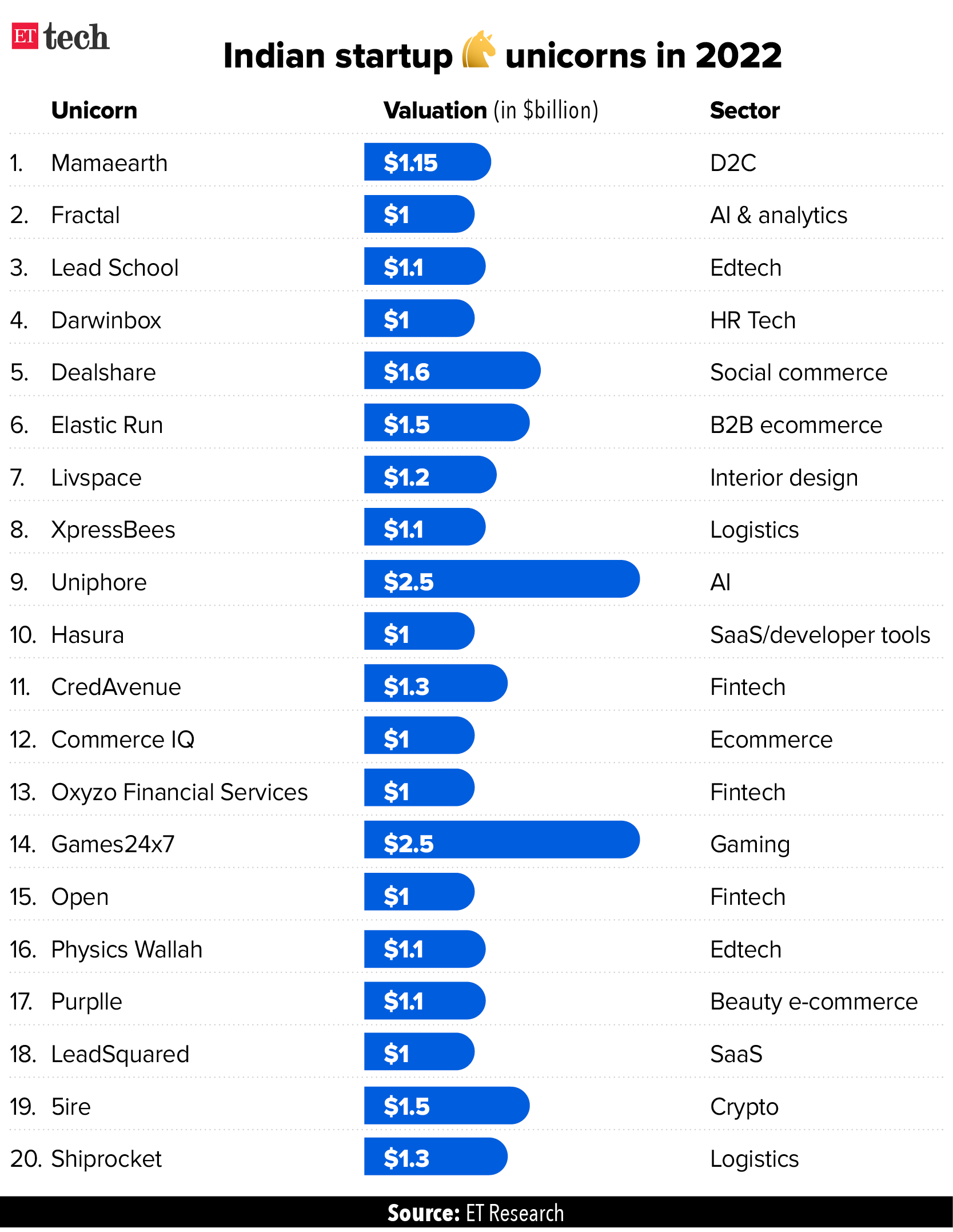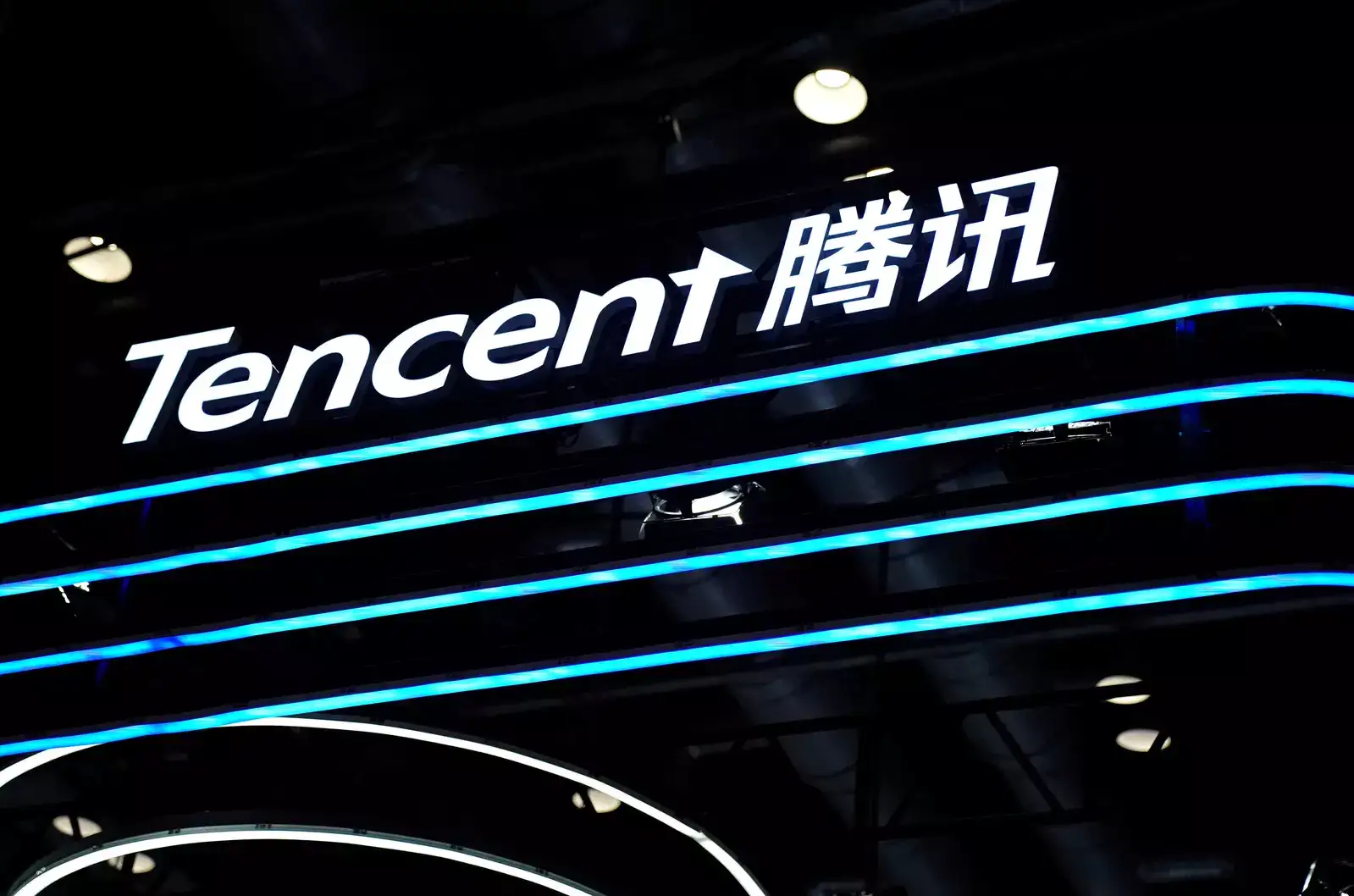Business News›Tech›Newsletters›Tech Top 5›Shiprocket is 20th unicorn of 2022; Flipkart gives Walmart an ad boost
 Daily Top 5 Daily Top 5 |
Shiprocket is 20th unicorn of 2022; Flipkart gives Walmart an ad boost
Want this newsletter delivered to your inbox?
I agree to receive newsletters and marketing communications via e-mail

Thank you for subscribing to Daily Top 5
We'll soon meet in your inbox.
Zomato-backed logistics startup Shiprocket has raised about $32 million from existing investors at a valuation of $1.3 billion, becoming the 20th unicorn of what has been a subdued year of fundraising for Indian startups.
 Credit: Giphy
Credit: Giphy
Also in this letter:
■ Walmart's ad revenue grew 30% in June quarter led by Flipkart, Connect
■ India’s chip component market to hit $300 billion by 2026: report
■ Stride Ventures closes its $200 million India Fund II

Logistics aggregator Shiprocket has approved a fundraise of Rs 259 crore ($32 million) from existing investors Temasek, Lightrock India and others at a valuation of around $1.3 billion, regulatory documents sourced from Tofler showed.
This makes it the latest entrant to India's startup unicorn club – the 2oth this year.

The company was last valued at $900-950 million after raising $185 million in a funding round led by food delivery company Zomato, Temasek and Lightrock in December. After the latest investment, Temasek's stake in the company will increase to 5.75% and Lightrock’s to 4.79%.
Shopping spree: Shiprocket has been on an acquisition spree of late. We reported on June 15 that it acquired a majority stake in rival Pickrr for about $200 million, and was closing a deal with Shiplyte. It also acquired Omuni, the omni-channel technology business of apparel manufacturer and retailer Arvind Ltd, in a Rs 200 crore cash-and-stock deal in July.
These acquisitions come as logistics companies are increasingly focussing on delivering in one or two days. Typically, direct-to-consumer (D2C) brands struggle to deliver goods quickly on their own. Shiprocket said the Omuni deal would ensure better inventory utilisation, faster delivery and optimisation of operational costs.
Winter unicorn: Shiprocket’s emergence as a unicorn comes amid a slowdown in big-ticket funding deals.
India has over 100 unicorns, and 44 of these joined the club in 2021, when the markets were flush with funds.
We reported on July 5 that venture funding for Indian startups dipped 37% in the second quarter of this year to $6.9 billion.

Driven by its advertising business Walmart Connect and Indian ecommerce marketplace Flipkart, retail giant Walmart’s advertising revenue jumped 30% year-on-year (YoY), the firm said during its June quarter earnings call.
The revenue of Walmart International, which includes Flipkart, rose 5.7% year-on-year in the June quarter to $24.4 billion.
Ad hub: Walmart International chief executive and president Judith McKenna had said in June that India was Walmart’s biggest market “by a long way” for ad revenue.
It also uses Flipkart's advertisement technology in other markets such as Chile.
Prakash Sikaria, senior vice-president of growth and monetisation of Flipkart, told us in early July that ad revenue comprises 2-3% of Flipkart's gross merchandise value. GMV is the total value of goods sold on a marketplace over a period of time.
Yes, but: In 2021, Walmart clocked $2.1 billion from its ad business worldwide, while Amazon generated $31 billion.
Why it matters: Ads have become an important revenue stream for ecommerce companies as they can make profits from operations by giving sellers tools and software to advertise on marketplaces for better discoverability. For Walmart, it is the fastest growing revenue stream.
India is also a key market outside the US for Walmart, along with Canada, Mexico and China. The US retailer operates in over 23 countries outside the US, and together they contribute over $100 billion in revenue, or about 18% of Walmart’s total.
PhonePe goes its own way: On Wednesday morning we reported that PhonePe is scripting a detailed plan to fuel its ecommerce strategy as it integrates with the government’s Open Network for Digital Commerce (ONDC) and breaks away from its Flipkart roots.

India’s semiconductor component market will see its cumulative revenues climb to $300 billion during 2021-2026, according to a new report.
The ‘India Semiconductor Market Report, 2019-2026’, a joint study by the India Electronics & Semiconductor Association (IESA) and Counterpoint Research, said India is poised to be the world’s second-largest market in terms of scale and demand for semiconductor components.
The study noted that India’s end equipment market in 2021 stood at $119 billion in terms of revenue and is expected to grow at a compound annual growth rate (CAGR) of 19% from 2021 to 2026.
It added that this was being bolstered by the increasing pace of digital transformation and the adoption of new technologies in smartphones, PCs, wearables, cloud data centres, Industry 4.0 applications, IoT, smart mobility, and advanced telecom and public utility infrastructure.
The report said that the electronic system design and manufacturing (ESDM) sector in India will play a major role in the country’s overall growth, from sourcing components to design manufacturing.
 Ishpreet Singh Gandhi, founder, Stride Ventures
Ishpreet Singh Gandhi, founder, Stride Ventures
Venture debt firm Stride Ventures has closed its $200 million India Fund II a year after closing its first fund amid soaring demand for debt funding among startups. The fund saw participation from banks, family offices, corporate treasuries and private equity funds.
Quote: “We have committed a large portion of the fund towards leading startups, and our goal is to continue being a preferred lender while developing alternate financing solutions,” said Ishpreet Singh Gandhi, founder, Stride Ventures.
The firm has backed prominent startups such as Yubi (formerly CredAvenue), MyGlamm, Zepto and BluSmart, among others.
Cactus raises Rs 350 crore: Meanwhile, Cactus Venture Partners announced it has raised Rs 350 crore in the initial close of its maiden fund, which will focus on clean-tech, health-tech, and B2B SaaS companies in India. The fund said it is in active discussions with several domestic and international institutional investors and anticipates the final close of its fund at Rs 750 crore by December.
Other Done Deals
■ Electric vehicle fast-charging startup Exponent Energy raised $13 million in funding led by Lightspeed Venture Partners. Existing investors like YourNest VC, 3one4 Capital and AdvantEdge VC also participated in the round. It will use the capital to scale its charging network to 100 points per city, starting with Bengaluru.
■ Yes Bank has invested an undisclosed amount in Venture Catalysts Group Fund — an integrated startup incubator offering funding, mentorship and networking to startup founders. Founded in 2015 by Apoorva Ranjan Sharma, Anuj Golecha, Anil Jain, and Gaurav Jain, Venture Catalysts deploys investments between $250,000 and $1.5 million in early-stage startups. So far, it has backed over 110 startups including BharatPe and Beardo.

Chinese tech giant Tencent Holdings reported a 3% decline in its Q2 revenue to $19.78 billion — the first in its history – as covid lockdowns and growing regulatory pressure from Chinese authorities hampered its ad sales, Reuters reported.
The company also suffered due to China’s stringent gaming laws, which limit users’ playing time. Reuters also reported on Tuesday that Tencent was looking to sell all or a part of its $24 billion stake in food delivery firm Meituan to appease angry regulators.
Quote: "During the second quarter, we actively exited non-core businesses, tightened our marketing spending, and trimmed operating expenses, enabling us to sequentially increase our non-IFRS earnings, despite difficult revenue conditions,” said Ma Huateng, CEO of Tencent.
Like Tencent, Alibaba also reported a disappointing second-quarter result as Beijing’s strict rules choked its tech giants.
Today’s ETtech Top 5 newsletter was curated by Zaheer Merchant in Mumbai and Ruchir Vyas in New Delhi. Graphics and illustrations by Rahul Awasthi.

Also in this letter:
■ Walmart's ad revenue grew 30% in June quarter led by Flipkart, Connect
■ India’s chip component market to hit $300 billion by 2026: report
■ Stride Ventures closes its $200 million India Fund II
Logistics aggregator Shiprocket turns unicorn with $32 million funding

Logistics aggregator Shiprocket has approved a fundraise of Rs 259 crore ($32 million) from existing investors Temasek, Lightrock India and others at a valuation of around $1.3 billion, regulatory documents sourced from Tofler showed.
This makes it the latest entrant to India's startup unicorn club – the 2oth this year.

The company was last valued at $900-950 million after raising $185 million in a funding round led by food delivery company Zomato, Temasek and Lightrock in December. After the latest investment, Temasek's stake in the company will increase to 5.75% and Lightrock’s to 4.79%.
Shopping spree: Shiprocket has been on an acquisition spree of late. We reported on June 15 that it acquired a majority stake in rival Pickrr for about $200 million, and was closing a deal with Shiplyte. It also acquired Omuni, the omni-channel technology business of apparel manufacturer and retailer Arvind Ltd, in a Rs 200 crore cash-and-stock deal in July.
These acquisitions come as logistics companies are increasingly focussing on delivering in one or two days. Typically, direct-to-consumer (D2C) brands struggle to deliver goods quickly on their own. Shiprocket said the Omuni deal would ensure better inventory utilisation, faster delivery and optimisation of operational costs.
Winter unicorn: Shiprocket’s emergence as a unicorn comes amid a slowdown in big-ticket funding deals.
India has over 100 unicorns, and 44 of these joined the club in 2021, when the markets were flush with funds.
We reported on July 5 that venture funding for Indian startups dipped 37% in the second quarter of this year to $6.9 billion.
Walmart's ad revenue grew 30% in June quarter led by Flipkart, Connect

Driven by its advertising business Walmart Connect and Indian ecommerce marketplace Flipkart, retail giant Walmart’s advertising revenue jumped 30% year-on-year (YoY), the firm said during its June quarter earnings call.
The revenue of Walmart International, which includes Flipkart, rose 5.7% year-on-year in the June quarter to $24.4 billion.
Ad hub: Walmart International chief executive and president Judith McKenna had said in June that India was Walmart’s biggest market “by a long way” for ad revenue.
It also uses Flipkart's advertisement technology in other markets such as Chile.
Prakash Sikaria, senior vice-president of growth and monetisation of Flipkart, told us in early July that ad revenue comprises 2-3% of Flipkart's gross merchandise value. GMV is the total value of goods sold on a marketplace over a period of time.
Yes, but: In 2021, Walmart clocked $2.1 billion from its ad business worldwide, while Amazon generated $31 billion.
Why it matters: Ads have become an important revenue stream for ecommerce companies as they can make profits from operations by giving sellers tools and software to advertise on marketplaces for better discoverability. For Walmart, it is the fastest growing revenue stream.
India is also a key market outside the US for Walmart, along with Canada, Mexico and China. The US retailer operates in over 23 countries outside the US, and together they contribute over $100 billion in revenue, or about 18% of Walmart’s total.
PhonePe goes its own way: On Wednesday morning we reported that PhonePe is scripting a detailed plan to fuel its ecommerce strategy as it integrates with the government’s Open Network for Digital Commerce (ONDC) and breaks away from its Flipkart roots.
India’s chip component market to hit $300 billion by 2026: report
India’s semiconductor component market will see its cumulative revenues climb to $300 billion during 2021-2026, according to a new report.
The ‘India Semiconductor Market Report, 2019-2026’, a joint study by the India Electronics & Semiconductor Association (IESA) and Counterpoint Research, said India is poised to be the world’s second-largest market in terms of scale and demand for semiconductor components.
The study noted that India’s end equipment market in 2021 stood at $119 billion in terms of revenue and is expected to grow at a compound annual growth rate (CAGR) of 19% from 2021 to 2026.
It added that this was being bolstered by the increasing pace of digital transformation and the adoption of new technologies in smartphones, PCs, wearables, cloud data centres, Industry 4.0 applications, IoT, smart mobility, and advanced telecom and public utility infrastructure.
The report said that the electronic system design and manufacturing (ESDM) sector in India will play a major role in the country’s overall growth, from sourcing components to design manufacturing.
Tweet of the day
Stride Ventures closes its $200 million India Fund II

Venture debt firm Stride Ventures has closed its $200 million India Fund II a year after closing its first fund amid soaring demand for debt funding among startups. The fund saw participation from banks, family offices, corporate treasuries and private equity funds.
Quote: “We have committed a large portion of the fund towards leading startups, and our goal is to continue being a preferred lender while developing alternate financing solutions,” said Ishpreet Singh Gandhi, founder, Stride Ventures.
The firm has backed prominent startups such as Yubi (formerly CredAvenue), MyGlamm, Zepto and BluSmart, among others.
Cactus raises Rs 350 crore: Meanwhile, Cactus Venture Partners announced it has raised Rs 350 crore in the initial close of its maiden fund, which will focus on clean-tech, health-tech, and B2B SaaS companies in India. The fund said it is in active discussions with several domestic and international institutional investors and anticipates the final close of its fund at Rs 750 crore by December.
Other Done Deals
■ Electric vehicle fast-charging startup Exponent Energy raised $13 million in funding led by Lightspeed Venture Partners. Existing investors like YourNest VC, 3one4 Capital and AdvantEdge VC also participated in the round. It will use the capital to scale its charging network to 100 points per city, starting with Bengaluru.
■ Yes Bank has invested an undisclosed amount in Venture Catalysts Group Fund — an integrated startup incubator offering funding, mentorship and networking to startup founders. Founded in 2015 by Apoorva Ranjan Sharma, Anuj Golecha, Anil Jain, and Gaurav Jain, Venture Catalysts deploys investments between $250,000 and $1.5 million in early-stage startups. So far, it has backed over 110 startups including BharatPe and Beardo.
Tencent sees first-ever revenue decline over regulatory pressure

Chinese tech giant Tencent Holdings reported a 3% decline in its Q2 revenue to $19.78 billion — the first in its history – as covid lockdowns and growing regulatory pressure from Chinese authorities hampered its ad sales, Reuters reported.
The company also suffered due to China’s stringent gaming laws, which limit users’ playing time. Reuters also reported on Tuesday that Tencent was looking to sell all or a part of its $24 billion stake in food delivery firm Meituan to appease angry regulators.
Quote: "During the second quarter, we actively exited non-core businesses, tightened our marketing spending, and trimmed operating expenses, enabling us to sequentially increase our non-IFRS earnings, despite difficult revenue conditions,” said Ma Huateng, CEO of Tencent.
Like Tencent, Alibaba also reported a disappointing second-quarter result as Beijing’s strict rules choked its tech giants.
Today’s ETtech Top 5 newsletter was curated by Zaheer Merchant in Mumbai and Ruchir Vyas in New Delhi. Graphics and illustrations by Rahul Awasthi.
Want this newsletter delivered to your inbox?
I agree to receive newsletters and marketing communications via e-mail

Thank you for subscribing to Daily Top 5
We'll soon meet in your inbox.
